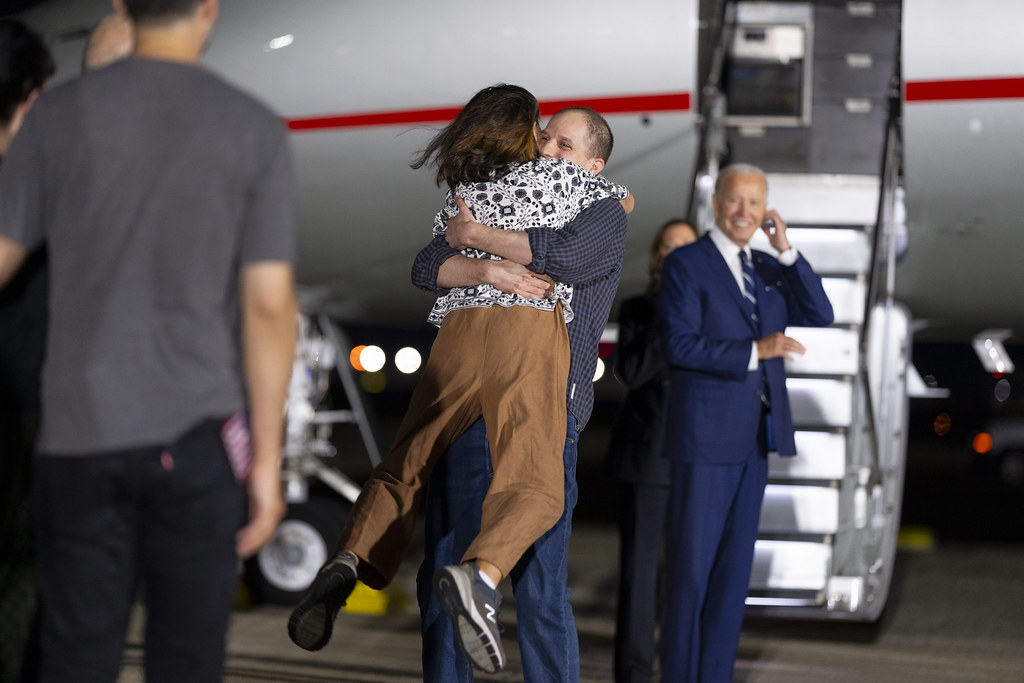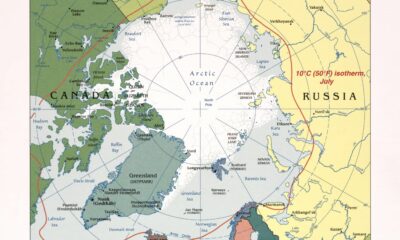Civilization
Heroes for Hitmen
Among the heroes traded for Russian hitmen were three journalists doing journalism’s most dangerous work: reporting from overseas.

Even the most principled journalists are whipping boys these days. Former President Donald Trump has called them enemies of the people. Their public standing has fallen with those of many other institutions. But another factor is at work, too. Serious journalists are lumped with partisan commentators on cable news and “reporters” for tendentious online newssheets.
Three journalists were real heroes
This makes it all the more worthwhile to stop a minute and reflect on the mega-prisoner swap last week. Among the 16 prisoners whom the Russian government released were three journalists who had put themselves at risk to keep us informed.
Evan Gershkovich of the Wall Street Journal was subjected to a show trial reminiscent of Soviet times that resulted in a 16-year sentence for espionage. He had been chronicling Russian government repression.
Alsu Kurmasheva, a Russian American, works for Radio Free Europe/Radio Liberty. Her 6 ½-year sentence was for “spreading false information” about the Russian Army. Kurmasheva edited a book, “Saying No to War,” about Russians who criticized their country’s invasion of Ukraine.
Many Americans do not know about, let alone appreciate, the exemplary work RFE/RL does by sending honest news into countries under leaders like Russian President Vladmir Putin.
A third prisoner was dissident Vladimir Kara-Murza, a British-Russian and a permanent resident of the United States. He received a Pulitzer Prize this year for columns he wrote for the Washington Post. Before going to jail, he survived two poisoning attempts. Kara-Murza, tried for treason and given a 25-year sentence, was arrested shortly after calling the Vladimir Putin’s government “a regime of murderers.”
The incarceration of these three individuals was brutal, with long interrogations and solitary confinement to small, cold cells.
The hitmen the Russians got back
Among the eight Russians to return home was Vadim Krasikov, who brazenly murdered a Russian dissident on a Berlin playground during daylight. He is considered a Putin favorite. Others in the exchange were not particularly notable spies. But in a previous exchange for basketball star Brittney Griner, Putin secured the release of two men who had been apprehended selling surface-to-air missiles to American agents posing as Columbian terrorists. One of their selling points was that missiles were good for shooting down U.S. helicopters.
A Russian escort on the plane accompanying Vladimir Kara-Murza to the United States told him sardonically, “Don’t have too much fun out there, because Krasikov could come back for you.”
The headline of the recent prisoner exchange should be “Hitmen for Heroes.”
Foreign correspondents
Journalists reporting overseas are highly visible and often envied. About a century ago, press critic and former foreign correspondent George Seldes called them “the nobility of American journalism.” They are relatively well-educated. At one time they went about their work in foreign capitals wearing morning coats and striped trousers like diplomats. Correspondents are a point of pride for news organizations, who spend large amounts of money to support them overseas.
With this sinecure came swagger. When Robert Casey of the old Chicago Daily News returned from covering a revolution, an accountant asked how he spent the $3,000 he had been advanced. Casey said he had no idea. The publisher told the accountant to forget it, explaining, “They were shooting at him with machine guns.”
Editors typically send their best reporters abroad because the jobs have been especially demanding. The reporters need to be self-reliant and able to work independently. They must have the skills to cover politics, economics, popular culture, and war. They need to be news polymaths.
Noted journalists who perished on the job
With the limelight has come danger. The casualty rate for journalists was higher in World War II than for military personnel. Individual stories of sacrifice to get the news during that war abound. The Associated Press’ Joe Morton was captured while covering Slovak partisans working behind the lines in the final months of the war. He was executed at the Nazis’ Mauthausen camp in Austria.
Many others were interned. At the start of the war in the Pacific the Japanese jailed John B. Powell, an American reporter in China. He was beaten, deprived of food, and forced to sit on his feet, which became gangrenous and had to be amputated. Powell was one of many heroic American journalists who had a Navy Liberty ship named after him.
The best known U.S. war correspondent in World War II was Scripps-Howard reporter Ernie Pyle. He won the 1944 Pulitzer Prize for covering U.S. Army infantrymen in Europe and was killed by Japanese machine gun fire on Okinawa the following year.
These are a small number of examples from just one newsworthy event. The full list dating from the 19th century is voluminous.
A more dangerous job today
The danger has mounted in recent years. Once American journalists had an advantage over those from other Western nations. The United States had a less significant record of colonization and thus were welcome in ways correspondents from Britain, France, and Germany were not.
But much has changed. With more military bases overseas than any other nation, and, for better or worse, a growing list of armed interventions in places like Iraq, the United States now has a history like other great powers. Terrorists have found it useful to target reporters for propaganda purposes.
The abduction of Daniel Pearl of the Wall Street Journal in 2002 is one such example. Pearl was in Pakistan to cover the American war on terrorism after the September 11 attacks on the United States the year before. The Islamist militants beheaded the reporter and released a video to advertise their barbarity.
American journalist Marie Colvin, who reported for the London Sunday Times, was known for her bravery when she perished covering the Syrian civil war in 2012. In response to a lawsuit filed by the family, a federal court held Syria’s government liable for tracking Colvin and shelling the journalism outpost where she stayed. Syrian officials were said to have celebrated her death.
News abroad is still worth gathering
The same forces that make foreign reporting perilous make it more important. The world is more hostile to the United States. We need to understand these threats.
No matter how much one believes in “America First,” we cannot avoid the consequences of what happens abroad. In our highly interdependent world, we become sick when people abroad become sick; our air suffers when fires burn in other countries; our economy is linked to economies abroad; conflicts in other nations become threats to us when they disrupt global affairs and, worse, spread.
The people who put their lives on the line to keep us informed deserve our praise. Their fearlessness is a bulwark.
If we are looking for an apt coda for the service these people perform, let’s think about what Evan Gershkovich wrote on the Russian form that he was required to fill out in order to be released. In a blank space at the end, he asked if Putin would give him an interview after his release.
This article was originally published by RealClearPolitics and made available via RealClearWire.
John Maxwell Hamilton, a longtime journalist, author and public servant, is the Hopkins P. Breazeale Professor of Journalism at the LSU Manship School of Mass Communication and a global scholar at the Woodrow Wilson International Center for Scholars, Washington, D.C. His most recent book is Manipulating the Masses: Woodrow Wilson and the Birth of American Propaganda.
The views that Mr. Hamilton expresses here are his own and do not necessarily reflect those of Conservative News and Views.
-

 Civilization4 days ago
Civilization4 days agoWhy Europe Shouldn’t Be Upset at Trump’s Venezuelan Actions
-

 Executive5 days ago
Executive5 days agoHow Relaxed COVID-Era Rules Fueled Minnesota’s Biggest Scam
-

 Christianity Today4 days ago
Christianity Today4 days agoSurprising Revival: Gen Z Men & Highly Educated Lead Return to Religion
-

 Civilization5 days ago
Civilization5 days agoThe End of Purple States and Competitive Districts
-

 Executive4 days ago
Executive4 days agoWaste of the Day: Can You Hear Me Now?
-

 Civilization1 day ago
Civilization1 day agoTariffs, the Supreme Court, and the Andrew Jackson Gambit
-

 Civilization2 days ago
Civilization2 days agoWhy Europe’s Institutional Status Quo is Now a Security Risk
-

 Civilization3 days ago
Civilization3 days agoDeporting Censorship: US Targets UK Government Ally Over Free Speech














